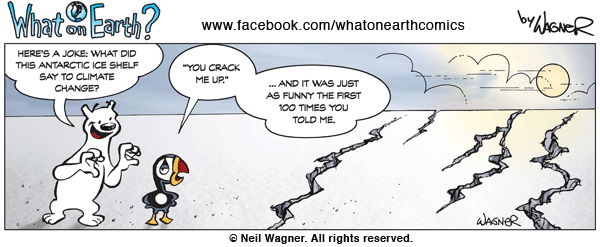

A recent study found that West Antarctic ice shelves are fracturing at an ever-faster rate, thus losing hold of the rocky walls that slow their flow out to sea. Bottom line: our warming globe is depleting the South Pole's ice cap faster than it can be replenished.
Traditionally, as ice slowly moves out to sea, it bunches up and creates a bottleneck that acts as a doorstop to impede the ice's flow (Check out Extreme Ice Survey to see time lapse photography of ice flow.) But the observed increase in fracturing leads to an increase in calving (when a big chunk of ice simply splits off). Result? An increase in icebergs, and a decrease in ice that sits on (or clings to) the continent.
Unfortunately, this news, from glaciologists at The University of Texas at Austin's Institute for Geophysics, is not an anomaly. Melting, cracking, splitting and calving in Earth's cryosphere (the parts of the globe where water is frozen) may be the most dramatic embodiments of the climatic changes our actions are triggering. Here is just a sampling of some other similarly troubling findings:
- Two Canadian ice shelves -- in place before Europeans settled the area -- have been dramatically melting. One is on the verge of melting away completely.
Dramatic, right? But why should all this melting ice matter to us? Here are a few reasons:
Dr. Martin Sommerkorn, senior climate change adviser for the World Wide Fund for Nature's international Arctic program:
Remove the Arctic ice cap and we are left with a very different and much warmer world. [It will] set in motion powerful climate feed-backs which will have an impact far beyond the Arctic itself, [and could] lead to flooding affecting one quarter of the world's population, substantial increases in greenhouse gas emission from massive carbon pools, and extreme global weather changes.
A recent study published on Climate Central:
Arctic Warming -- which is happening twice as fast as the rest of the Northern Hemisphere -- is altering weather patterns and leading to high-impact, extreme weather events in the United States and Europe.
The Geological Society of America, 2002:
"The recent collapse of several Antarctic Peninsula ice shelves has been linked to rapid regional atmospheric warming during the twentieth century."
Science Daily reporting on two 2007 studies:
Scientists consider that the acceleration of the melting of the Greenland ice cap could play an important role in the future stability of ocean circulation and, hence, in the development of climate change.
Science tells us that Earth's cryosphere is very important, and that it's being severely compromised by anthropogenic climate change. Does all this melting and cracking bring any good news? Sled dogs will finally get a rest? Titanic historical reenactment societies can put all the extra icebergs to good use? I'll keep working on it.
Like "What on Earth?" on Facebook.
Become a Fan here at The Huffington Post.